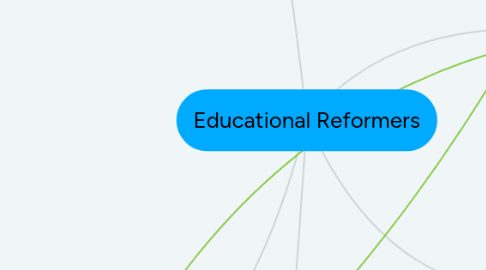
1. Dan Pink
1.1. Work at your own pace
1.1.1. Results-Only Work Environment (ROWE)
1.1.1.1. Meetings are optional
1.1.1.2. Self-directed
1.1.1.3. The only rule is that you complete your work on time!
1.2. Extrinsic motivators
1.2.1. Good for mechanical, mindless tasks
1.2.2. Not effective for anything requiring cognitive ability
1.2.3. Create stress and pressure
1.2.4. Lower performance & productivity under most circumstances
1.2.5. Carrots & sticks
1.2.6. Microsoft's failed Encarta encyclopedia
1.3. Intrinsic motivators
1.3.1. When you're working on something that matters, is important, that you like, or that affects you somehow
1.3.2. Boosts creativity and productivity
1.3.3. Give you a better quality of life and help you learn more
1.3.4. Are being utilized more and more in business & schools
1.3.5. 20% Time, Passion Projects, Genius Hour
1.3.6. The wildly successful Wikipedia model
2. Joshua Katz
2.1. Standardized testing
2.1.1. Causes anxiety & is killing our kids
2.1.2. Our only (ineffective) way of creating accountability
2.1.3. Terribly inaccurate measure of student success & growth
2.1.4. Unfair for at-risk students
2.2. At-Risk Students
2.2.1. Often live in poverty
2.2.1.1. Hunger
2.2.1.2. Homelessness
2.2.1.3. Sleep-deprived
2.2.2. Struggling
2.2.2.1. Need basic skills such as simple math and writing their own name
2.2.3. Need to have their successes celebrated rather than being labelled falsely as failures
2.3. What's best for students?
2.3.1. Life skills
2.3.1.1. Home economics
2.3.1.1.1. Taxes
2.3.1.1.2. Money
2.3.1.1.3. Basic math
2.3.1.2. Trade school for students who want to be tattoo artists, barbers, mechanics, etc.
2.3.2. Character education
2.3.2.1. Work ethic
2.3.2.2. Right from wrong
2.3.2.3. Social skills
2.3.2.3.1. Empathy
2.4. Toxic, Money-based Culture
2.4.1. Private companies monetize student failure
2.4.1.1. Schools branded as failures due to standardized tests
2.4.1.1.1. Money spent on textbooks written by private companies
2.4.1.2. Teachers branded as failures due to standardized tests
2.4.1.2.1. Teachers are sent to trainings and given manuals created by private companies
2.4.1.2.2. Teachers are not given a say when it comes to policy-making in education
2.4.1.3. Students are branded as failures due to standardized tests
2.4.1.3.1. Study guides for SATs, ACTs, and other tests created by private companies
2.4.1.3.2. Pressure to perform well and anxiety/fear of failure
2.4.1.3.3. Low-scoring and at-risk students are affected the most
2.4.1.3.4. Not everyone learns the same way and not everyone needs to go to college, but students feel pressure to do so
2.4.1.4. Private companies create the standardized tests and materials for many states
2.4.1.4.1. They also fund lobbying groups that convince government agencies to adopt the policies that put tests and standards in place
2.4.2. Are we doing what is best for the students?
2.4.2.1. Long-term student success
2.4.2.1.1. Could be college, could be a job, could just be helping them be functional human beings
2.4.3. Our current culture emphasizes "rigor" and "accountability," which means that some subjects are overlooked in the curriculum despite being desperately needed.
2.5. How can the education system that put a man on the moon in less than ten years with less technology than a cell phone have been a failure?
3. Taylor Mali
3.1. Teachers make a difference, more so than anyone else, in the lives of their students.
3.1.1. We need a greater number of passionate teachers.
3.2. Teaching is a difficult but rewarding job.
3.2.1. Teachers need to be more vocal about informing the current culture on this point. Money matters less than helping children succeed.
3.2.1.1. Respect for educators
3.2.2. "Education is not the filling of a pail, but the lighting of a fire." ---Unknown
3.2.3. We're here to help our students succeed, not for any other reason. That's the most important thing about teaching.
